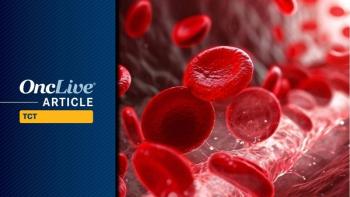
Dr. Lesokhin on the Current Treatment Landscape of Myeloma

Alexander M. Lesokhin, MD, assistant attending, Department of Medicine and Myeloma Service, Memorial Sloan Kettering Cancer Center, discusses the current treatment landscape for patients with multiple myeloma.
Alexander M. Lesokhin, MD, assistant attending, Department of Medicine and Myeloma Service, Memorial Sloan Kettering Cancer Center, discusses the current treatment landscape for patients with multiple myeloma.
The treatment paradigm has evolved continuously over the last 4 to 5 years, due in large part to the ongoing development of monoclonal antibodies, second-generation proteasome inhibitors, and the combination of immunomodulatory drugs (IMiDs) and monoclonal antibodies. Specifically, in the first-line setting, it is now the standard of care to administer 3-drug regimens of a proteasome inhibitor, IMiD, and dexamethasone, explains Lesokhin. A patient will then receive a stem cell transplant if they are eligible, followed by maintenance therapy. Transplant ineligible patients will receive induction therapy followed by maintenance therapy of lenalidomide (Revlimid).
In the relapsed setting, there a number of available 3-drug regimens, Lesokhin says. Lenalidomide, dexamethasome, and carfilzomib (Kyprolis), daratumumab (Darzalex), dexamethasone, and lenalidomide, as well as daratumumab, pomalidomide (Pomalyst) and dexamethasone have all been effective in this space, says Lesokhin.



































